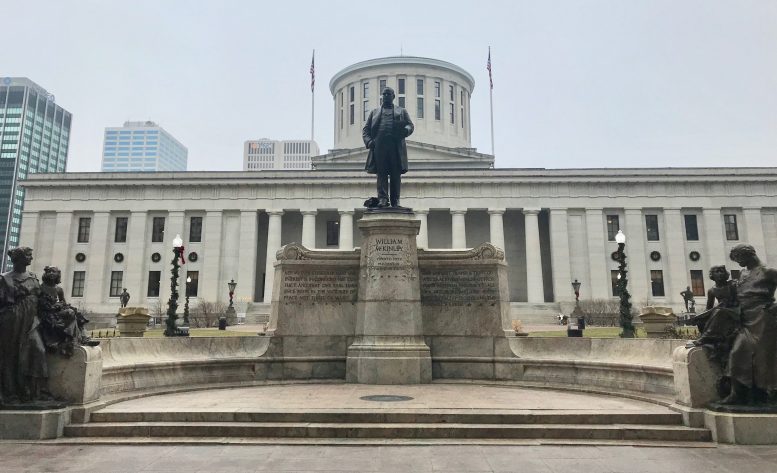BY NICK EVANS
The Ohio House approved measures Thursday to change the presidential nomination deadline, even though Democrats announced a virtual convention to comply with state deadlines, and to bar foreign contributions in statewide issue campaigns. Democratic members argue the latter bill is more likely to stamp out statewide ballot initiatives than foreign influence.
The approvals come a just under a week after Gov. Mike DeWine called a special session to get President Joe Biden on Ohio’s ballot and consider the foreign money ban. Earlier legislative attempts had stalled because the Ohio Senate attempted to use the high leverage vote to tie its foreign influence provision to the nomination changes.
On Tuesday, shortly after the special session began, the Senate approved its latest legislative fix. Again, senators tacked presidential nomination changes and foreign influence prohibitions onto unrelated legislation that already passed the state House. Also Tuesday, Democrats announced their virtual convention, eliminating the necessity of Ohio lawmaker action.
Thursday’s session didn’t go smoothly. As House Speaker Jason Stephens attempted to introduce the first of two pieces of legislation, Democrats shouted him down, attempting to adjourn the session before it even began. On the way to passage, the foreign influence measure was amended to include green card holders in the definition of “foreign nationals.” That puts Ohio’s bill at odds with federal law.
Supporters emphasize that the foreign influence language would extend an existing ban on foreign contributions to issue campaigns. In practice, holdouts contend, it would also require grassroots organizers to register as PACs — significantly raising the bar for getting a proposal on the ballot. Furthermore, the measure turns significant power over ballot proposals to the Ohio Attorney General’s office, instead of the bipartisan Ohio Elections Commission, as Democrats sought.
[RELATED: Ohio GOP leaders’ push to stop foreign money does nothing about transparency]
The push to ban foreign contributions in ballot issue campaigns comes on the heels of several high-profile statewide issues that served as a rebuke to Republican leaders. Senate President Matt Huffman, in particular, took the losses hard, and hinted at continued efforts to undercut those initiatives.

The House’s rejoinder
In the House, Republicans and Democrats agree that limiting foreign influence is a good idea. Democrats and at least some Republicans also expressed qualms about the sweeping prohibitions the Senate contemplated. Thursday morning in the House Government Oversight committee, Rep. Bill Seitz, R-Cincinnati, laid out the policy changes he negotiated into the bill addressing foreign money.
“The first point is the new bill puts everything in a new code section, and is only five pages long,” Seitz said. “So we have taken what I said to heart, that the shortest distance between two points is a straight line, and we’re being very concise and clear in what we’re doing here in the bill.”
The proposal would make it illegal for a foreign national to spend money on candidates or statewide issues. The first violation would be a first-degree misdemeanor moving to a fifth-degree felony for subsequent violations. Seitz explained it would also put enforcement in the hands of the Attorney General instead of the Ohio Elections Commission.
“We all know that the OEC takes its jolly good time and frequently is unable to adjudicate anything prior to an election,” Seitz explained.
Democrats pushed back forcefully on further empowering the AG.
“Any voter in Ohio, any elector,” Rep. Dani Isaacsohn, D-Cincinnati, said, “can allege a violation of a law that is poorly drafted, overly broad, incredibly vague, very confusing, hard to understand — can allege a violation of that law, and then that allegation can be directly and immediately investigated and prosecuted by the Attorney General.”
He noted that the AG would be responsible for allegations of foreign influence in any race, which could be leveraged in political fights.
“So if someone voted the wrong way for Speaker of the House, for example, their campaign committee might face some allegations,” he said, alluding to the running battle between Speaker Stephens and several of the House’s conservative members.
More fundamentally, Isaacsohn criticized linking that bill with one to get President Joe Biden on Ohio’s ballot in the first place.
“What we are saying to the voters of Ohio, is if you want the right to vote for the president United States, we’re going to you have to trade in some of your other rights,” Isaacsohn said.

House debate & amendments
As the session was about to begin, Minority leader Allison Russo and Rep. Michael Skindell, D-Lakewood, shouted out motions to adjourn. With the Democratic National Committee announcing a virtual nomination vote, they argued, the core purpose of the special session was already settled.
That went nowhere.
Next, Seitz took the floor and explained the bill. He dismissed Democrats’ concerns about putting the AG in control of investigating foreign influence. The state elections commission moves too slowly and has fewer resources, he argued. And Seitz instead attempted to turn the issue against Democrats.
“I remember from 2016 to 2018, or thereabouts we heard from the national Democrats and who appointed a special prosecutor to look at this question rather than going through the Federal Elections Commission, all we heard for three years from Mueller and the gang was Russia, Russia, Russia, Russia, Russia.”
Notably, special counsel Robert Mueller, like any other special counsel, was appointed to insulate the investigation from political influence — a level of independence Democrats contend an elected Attorney General simply doesn’t have.
Rep. Isaacsohn argued Attorney General Dave Yost has repeatedly demonstrated “a willingness to use his office to pursue political gains.” He noted the Sixth Circuit Court of Appeals has ordered him to stop obstructing a ballot issue to end qualified immunity, and a different trial has produced questions about his alleged role in an effort to undermine a citizen repeal of HB 6.
“If you want to clarify state law to match federal law, that would be fine with us,” Isaacsohn insisted. “We oppose foreign money in our politics and would support a clean bill that actually did that. Instead, this bill uses vague language to create a culture of fear and confusion around engaging in political activity.”
Isaacsohn’s amendment keeping investigative authority in the hands of the Ohio Election Commission failed.

Rep. Brian Stewart, R-Ashville, offered a different amendment, that would use a more expansive definition of “foreign national.” Unlike the federal definition it would include lawful permanent residents, or green card holders.
He pointed to a 2022 ballot initiative barring non-citizens from voting in any Ohio elections. Existing laws already kept them from participating in state or federal contests, but some municipalities wanted to allow them to weigh in on local matters.
“The bill that we have before us today,” Stewart argued, “says these same non-citizen green card holders who cannot vote in our elections are for some reason still nevertheless allowed to spend millions of dollars potentially to influence the same elections that they are barred from voting in.”
“This makes no sense,” he said.
Without extending the bill’s prohibitions to green card holders, Stewart argued, there’s “an asterisk” on the measure. He dismissed it as a “diet coke foreign money ban.”
Seitz pushed back, arguing the U.S. Supreme Court decision that upheld penalties for non-citizens making campaign contributions makes a distinction for green card holders. He quoted a footnote in which Justice Brett Kavanaugh wrote that including lawful permanent residents would “raise substantial questions not raised by this case.”
“Why did they say it was a substantial question?” Seitz argued. “They are trying to tell us something by saying that.”
Nevertheless, Stewart’s amendment passed easily.
Before the measure went to a vote, Minority Leader Allison Russo took the floor and warned Republicans their effort would backfire. She made explicit reference to the GOP’s poor showing in statewide ballot measures last year and alluded to the anti-gerrymandering proposal planned for this November.
“Your power grab today will not be forgotten in November,” she said, “just as it was not forgotten in August when you were defeated, just as it was not forgotten in November, last November, when you were defeated.”
The House approved the foreign influence measure along party lines.
The nomination deadline measure — the ostensible reason for the special session — prompted some debate, but nothing as contentious as the foreign money bill. Rep. Jamie Callender, R-Concord, brought Republican frustration with court cases meant to keep Donald Trump off the ballot.
“Those of us on this side of the aisle saw that as fundamentally unfair, immoral, unjust,” Callender said. “We are better than that here in Ohio. Let’s show the world that we are better than that.”
The bill passed, and passed easily, but Callender’s appeal to the chamber’s better angels fell on deaf ears. Thirty-one Republicans — nearly half the caucus — voted no.



